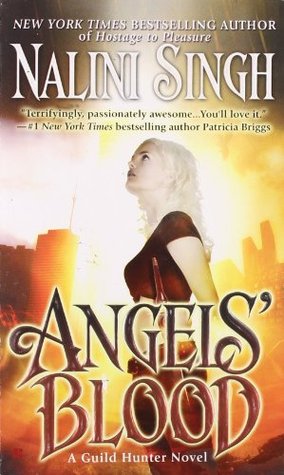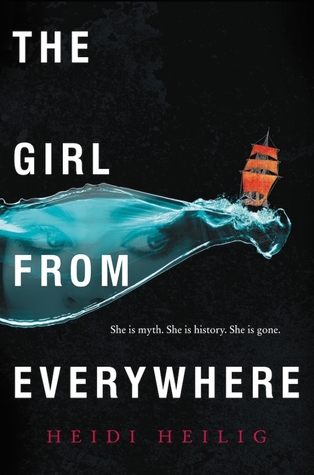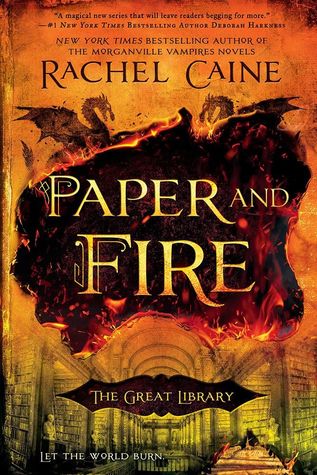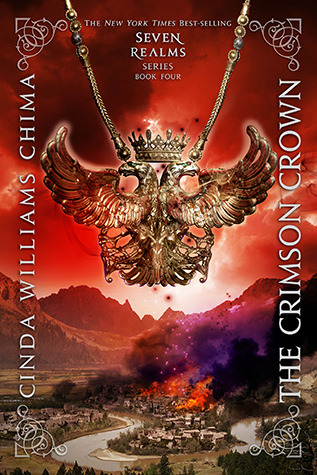 Angels' Blood was the choice for July for the Unapologetic Romance Readers group on Goodreads. Yes, we went paranormal! There are a few paranormal nominations up for August, too, but nothing has been decided yet in that front. The story here follows Elena, the best vampire hunter in the world. (It seems to be a thing in books like this that, if a woman has a vocation, she has to be the absolute best at it. Apparently us women who are not the best at what we do will never feel the elemental force of a love such as this.) In Elena's world, vampires are common knowledge, and while most of them aren't a problem, sometimes one decides to go rogue and slip the leash of its master--an angel. In this universe, angels not only control vampires, they create them, through a means that isn't common knowledge to the human part of the populace. Elena is a human...but she's also a born vampire hunter, meaning that she can scent vampires and hunt them down, and return them to their masters. Or kill them. Whichever skill is demanded. She works for a Guild, which is run by her best friend, Sara, and which handles all vampire-hunting contracts. There is no rogue hunting here, or at least if there is, we don't see any mention of it in this book.
Angels' Blood was the choice for July for the Unapologetic Romance Readers group on Goodreads. Yes, we went paranormal! There are a few paranormal nominations up for August, too, but nothing has been decided yet in that front. The story here follows Elena, the best vampire hunter in the world. (It seems to be a thing in books like this that, if a woman has a vocation, she has to be the absolute best at it. Apparently us women who are not the best at what we do will never feel the elemental force of a love such as this.) In Elena's world, vampires are common knowledge, and while most of them aren't a problem, sometimes one decides to go rogue and slip the leash of its master--an angel. In this universe, angels not only control vampires, they create them, through a means that isn't common knowledge to the human part of the populace. Elena is a human...but she's also a born vampire hunter, meaning that she can scent vampires and hunt them down, and return them to their masters. Or kill them. Whichever skill is demanded. She works for a Guild, which is run by her best friend, Sara, and which handles all vampire-hunting contracts. There is no rogue hunting here, or at least if there is, we don't see any mention of it in this book.Elena's skills are truly put to the test when she's summoned by Raphael, the archangel of New York, and commissioned to hunt not a vampire, but another archangel. She doesn't know why, and she doesn't know how, because she can't sniff out angels...or can she? (She can, clearly, but it's a bit more complicated than that.)
This is supposed to be a paranormal romance, but I didn't see anything really romantic about it. There is no romantic chemistry between Elena and Raphael. Pure, animal lust? Yes. But no romance. They're pretty much constantly pawing at each other, but without any real emotion other than rage involved, until they're about to sleep together, at which point Singh decides to have them catch feelings so it's not meaningless sex, which I guess is frowned upon in romance. It felt weird, this sudden twitching of hearts and such, when there had been no build up to it before. I mean, I love a good "kiss me/kill me" dynamic, but this just didn't have a romance dynamic at all so it was really weird that suddenly Raphael "loved" Elena enough for the end of the book to come about as it did.
There were two other things that bothered here. First, that Elena clearly has a traumatic past, and yet it's never laid out. Singh spends much of the novel dropping little hints about Elena's background, but even though Raphael asks (He doesn't just know? What kind of an archangel is he? Shouldn't he have done this research on her before hiring her?) Elena doesn't spill. This felt really weird, like it was a component that was just missing from the book. Another URR group member has read more of this series and says that it comes out in the second book, but I honestly think it would have fit properly in this one and would have made some of Elena's PTSD-like symptoms fit in a bit better context with the horrors she was witnessing. Second, the ending just felt sloppy. A few other people had issues with Singh's writing in general, but I found it pretty much in line with what I've come to expect with paranormal fantasy and romance, except for the end. To me, the ending felt hackneyed and rushed, like Singh just got sick of writing and decided to just tie things up as quickly as possible. And Elena actually have very little to do with the end of the book, both the conflict and what came after, considering that she was the main character.
Some things I did like about this: the world and the physical aspects of Raphael and Elena's relationship...up to the point until they start having sex. I think the world was neat, with angels not being religious figures and instead just being a sort of supernatural species (I might not have found this as neat if I wasn't currently reading another paranormal fantasy in which angels are still religious figures) and their dynamic with vamps was one I haven't seen before. The part that an angel could become a psychopathic serial killer was also one I haven't encountered before. I liked how angels, vampires, and the guilds that work with and against them were integrated into society, with some of the complications they entail. On the "relationship" aspect, I think while Elena and Raphael were still at odds but making out, there was some really hot writing going on. But then, as soon as they catch feelings and go to have sex, Singh totally skimped out and just faded to black, which was very strange given the actions and language the two had been using beforehand.
Overall, I think I liked this, but not enough to continue the series. I'm gonna give it 3 stars, but for the interesting angel/vampire/hunter dynamics and some of the making out rather than the actual plot and romance, or lack thereof.










